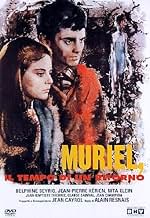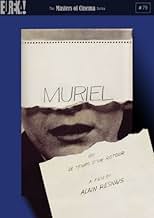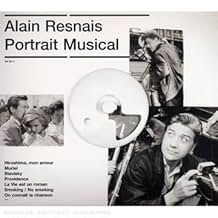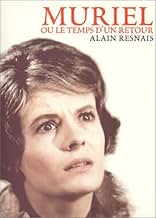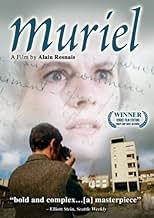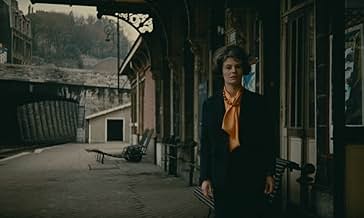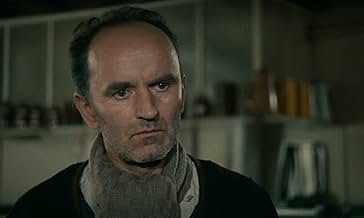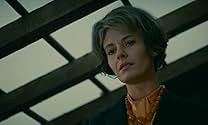AVALIAÇÃO DA IMDb
7,0/10
4 mil
SUA AVALIAÇÃO
Adicionar um enredo no seu idiomaIn the seaside town of Boulogne, no one seems to be able to cope with their past, least of all Hélène, an antique furniture saleswoman, her stepson Bernard, and her former lover Alphonse.In the seaside town of Boulogne, no one seems to be able to cope with their past, least of all Hélène, an antique furniture saleswoman, her stepson Bernard, and her former lover Alphonse.In the seaside town of Boulogne, no one seems to be able to cope with their past, least of all Hélène, an antique furniture saleswoman, her stepson Bernard, and her former lover Alphonse.
- Prêmios
- 3 vitórias e 3 indicações no total
Jean-Baptiste Thiérrée
- Bernard Aughain
- (as Jean-Baptiste Thierrée)
Wanda Kerien
- La cliente
- (as Wanda Kérien)
Avaliações em destaque
I had never seen an Alain Resnais movie before. Despite the fact most of my IMDb friends had told me to start off with Hiroshima Mon Amour, I was more drawn to Muriel and chose it as my first taste of Resnais. In a nutshell: it was far more interesting thematically and cinematographically (also on a purely technical level) than it was enjoyable. I'm still very glad that I saw it, though. The most fascinating aspect of it was without doubt the montage, or editing. Rather than directing or acting, or even the screen writing, it was the editing that had the lion's share of the movie, as if it were its star. I cannot think of another movie where this is quite as apparent. Some of Muriel's style of editing felt like machine-gun-fire, being so relentlessly fast and aggressive in parts, but it was in my opinion very powerful and efficient in leaving an impression of "mental flashes". This emulated the nature of memory, which is the theme at the heart of an otherwise grim and pessimistic movie. Yet this darkness is masked by an appearance of everyday banality in a provincial town, making it all the more depressing, since it's easier to relate the melancholy at its core to one's own, everyday existence. Not for nothing, the movie was also set in winter, and nothing is quite as melancholy and nostalgic as a sea-side town off-season.
The last 10 minutes of the movie, more or less from the "revelation" at Hélène's Sunday lunch right to the moments in which the word "Fin" (The End) appeared on the screen, were the most powerful bout of cinematic caffeine I've experienced in a while. Until that moment I was starting to worry that the film was going nowhere too specific, or at least not somewhere that I understood or knew. Then came the final emotional earthquake, redeeming the movie tenfold, and I was virtually just as shocked as most of the characters in it.
OK, I'll admit I wasn't overly enamoured of the acting. With the exception of Delphine Seyrig playing Hélène, who succeeded in convincing me with her interpretation of the character as well as making me feel sympathetic towards her, the other players left me virtually cold. For a while I thought I'd like Nita Klein playing Françoise, then I started thinking that her character was pretty much redundant and should have been far more marginal than it actually was (and what was going on between her and Bernard anyway? That felt like a contrivance). Since I mentioned Bernard, played by Jean-Baptiste Thierrée, let me say that he was the character I was least convinced by. Quite frankly, I wasn't partial to the way the actor chose to bring him to life at all. Yet he and his drama - the traumas he'd experienced during the Algerian war, his witnessing the torture of an Algerian girl, the titular Muriel, which scarred him for life - was probably the heart and kernel of the movie! Jean-Pierre Kérien playing Alphonse, is the player that most viewers here seem to criticise. In my view there wasn't much else he could have done with the character, seeing as he was mostly a pretext for Hélène's tragedy. But in the last ten minutes of the movie Alphonse's raison d'être comes sharply to the forefront, thanks to the shocking revelation previously mentioned. It was Bernard that I expected more from acting-wise, I guess. Furthermore, the soundtrack was occasionally strident and annoying, perhaps trying to be an aural version of the editing. But while it worked on a visual level, the music's jarred quality was ultimately grating.
However, for the courage with which the movie tackled subjects which are best rendered in a novel form, for its successfully experimental editing, as well as its genuinely moving ending, I'll still award Muriel a pretty high score: 7.5/10 (it would have been 8 if the acting, not just from Seyrig, had been more accomplished).
The last 10 minutes of the movie, more or less from the "revelation" at Hélène's Sunday lunch right to the moments in which the word "Fin" (The End) appeared on the screen, were the most powerful bout of cinematic caffeine I've experienced in a while. Until that moment I was starting to worry that the film was going nowhere too specific, or at least not somewhere that I understood or knew. Then came the final emotional earthquake, redeeming the movie tenfold, and I was virtually just as shocked as most of the characters in it.
OK, I'll admit I wasn't overly enamoured of the acting. With the exception of Delphine Seyrig playing Hélène, who succeeded in convincing me with her interpretation of the character as well as making me feel sympathetic towards her, the other players left me virtually cold. For a while I thought I'd like Nita Klein playing Françoise, then I started thinking that her character was pretty much redundant and should have been far more marginal than it actually was (and what was going on between her and Bernard anyway? That felt like a contrivance). Since I mentioned Bernard, played by Jean-Baptiste Thierrée, let me say that he was the character I was least convinced by. Quite frankly, I wasn't partial to the way the actor chose to bring him to life at all. Yet he and his drama - the traumas he'd experienced during the Algerian war, his witnessing the torture of an Algerian girl, the titular Muriel, which scarred him for life - was probably the heart and kernel of the movie! Jean-Pierre Kérien playing Alphonse, is the player that most viewers here seem to criticise. In my view there wasn't much else he could have done with the character, seeing as he was mostly a pretext for Hélène's tragedy. But in the last ten minutes of the movie Alphonse's raison d'être comes sharply to the forefront, thanks to the shocking revelation previously mentioned. It was Bernard that I expected more from acting-wise, I guess. Furthermore, the soundtrack was occasionally strident and annoying, perhaps trying to be an aural version of the editing. But while it worked on a visual level, the music's jarred quality was ultimately grating.
However, for the courage with which the movie tackled subjects which are best rendered in a novel form, for its successfully experimental editing, as well as its genuinely moving ending, I'll still award Muriel a pretty high score: 7.5/10 (it would have been 8 if the acting, not just from Seyrig, had been more accomplished).
"Muriel" (1963) directed by Alain Resnais is a drama about the persistence of memory (aren't all Resnains' films? Incidentally, I named my review of "Hiroshima Mon Amour" that I saw about two years ago, "Persistence of Memory".)
Muriel of the title is dead by the time the movie begins, the victim of torture by the French soldiers during the occupation of Algeria. One of the soldiers, Bernard, is back in France living with his step-mother, Helene (Delphine Seyrig) in the province city Boulogne and hunted by the memories of war and Muriel. Helen deals with her own past and memories of Alphonse (Jean-Pierre Kérien), an ex-lover who comes from Paris to visit her in the company of his new 20-years-old girlfriend, Françoise (Nita Klein)
The story which Resnais tells is simple and the trailer for the movie gives a viewer a very good idea of what they are about to see: The Past. The present. The future - is it possible? Uncertainty. Suspicions. Lies. Four main characters, Helene, Alphonse, Bertrand, and Françoise are in search of what they are. There will be secrets and confessions. Is that time to love? The main theme of the film is reality vs. memory of it. Can we always trust ourselves with what we remember? Does our memory reflect the events the way they really happened or our vision of them is altered as time passes and new realities inevitably enter our lives?
What makes "Muriel" unique after all these years is the way the director presents the journey into the past of his characters, how they see it, and how it affects their present lives and the possibility (or rather impossibility) of love and happiness. Alain Resnains uses quick flashes of memory in the form of almost hypnotizing jump cuts of his genius cinematographer Sacha Vierny (Resnains and Vierny had made 10 films together). Vierny provided beautiful melancholic visual palette of washed out colors that created the atmosphere of unbearable sadness, loss, and hopelessness. Vierny who always underlined his preference for atmosphere over formal perfection, had said, "My satisfaction is that the photography is not remarked on too much for itself". The visual originality and innovation are accompanied by unusual unnerving soundtrack, eerie and haunting that adds to the understanding of guilt and remorse the film characters live with.
"Muriel" is a puzzling and multi-layered film that is easy to admire and meditate on. It is not entertaining or heart-warming and it is hard to identify with its heroes (or anti-heroes) but is always fascinating and rewarding and it may reveal its secrets after multiple viewings.
Muriel of the title is dead by the time the movie begins, the victim of torture by the French soldiers during the occupation of Algeria. One of the soldiers, Bernard, is back in France living with his step-mother, Helene (Delphine Seyrig) in the province city Boulogne and hunted by the memories of war and Muriel. Helen deals with her own past and memories of Alphonse (Jean-Pierre Kérien), an ex-lover who comes from Paris to visit her in the company of his new 20-years-old girlfriend, Françoise (Nita Klein)
The story which Resnais tells is simple and the trailer for the movie gives a viewer a very good idea of what they are about to see: The Past. The present. The future - is it possible? Uncertainty. Suspicions. Lies. Four main characters, Helene, Alphonse, Bertrand, and Françoise are in search of what they are. There will be secrets and confessions. Is that time to love? The main theme of the film is reality vs. memory of it. Can we always trust ourselves with what we remember? Does our memory reflect the events the way they really happened or our vision of them is altered as time passes and new realities inevitably enter our lives?
What makes "Muriel" unique after all these years is the way the director presents the journey into the past of his characters, how they see it, and how it affects their present lives and the possibility (or rather impossibility) of love and happiness. Alain Resnains uses quick flashes of memory in the form of almost hypnotizing jump cuts of his genius cinematographer Sacha Vierny (Resnains and Vierny had made 10 films together). Vierny provided beautiful melancholic visual palette of washed out colors that created the atmosphere of unbearable sadness, loss, and hopelessness. Vierny who always underlined his preference for atmosphere over formal perfection, had said, "My satisfaction is that the photography is not remarked on too much for itself". The visual originality and innovation are accompanied by unusual unnerving soundtrack, eerie and haunting that adds to the understanding of guilt and remorse the film characters live with.
"Muriel" is a puzzling and multi-layered film that is easy to admire and meditate on. It is not entertaining or heart-warming and it is hard to identify with its heroes (or anti-heroes) but is always fascinating and rewarding and it may reveal its secrets after multiple viewings.
Resnais is one of the seven sages of cinema, perhaps even one of the most important ones. Within him we find others, like Godard and Marker, who inherited the problems he first posited with clarity of vision and eloquence of mood. Problems of memory, firstly how the past forms manifest in consciousness and synthesize an illusionary space which we then inhabit (in itself a poignant inspection of the mechanisms of cinema), more importantly what these past forms are, which we understand as the self and identity, and how they trap us in meaningless dilemmas.
His astounding contribution to this field, is in how he brilliantly envisions this space by means of a visual vocabulary and how he articulates within it. The museum in Hiroshima (which reappears here again, as homage), the hotel in Marienbad.
We find the wandering of memory again in Muriel, in a form a tad less inspired this time than those films.
Passions past and present, which defined the participants as persons and left indelible marks on their souls, we see how they appear again after time. We see these people use memory as the only means of reliving time, of painfully trying to claim again the ethical vindication that escaped them the first time. How this past, projected in their minds, appears again around them to trap them anew. And we see how, their lives stifled as a result of those past anxieties, the memory of these things points at no way out.
The characters in this are fittingly restless, always rushing particularly nowhere, actually running from things they won't admit. Running perhaps against all hope that they will face them again. Moments of reflection are burdened with half-remembered sadness, while life outside continues indifferently.
Entire scenes of this play out as they would in ordinary melodrama, then the narrative seems to break down for a time. Virtually recalling fragments of images and conversations which mean nothing, we become privy to the destructive powers of memory. We actually experience the disorientation as part of the movie.
But Muriel lacks something in comparison to those other films. Perhaps it's the political angle (re the Algiers conflict and how it resonates in a complacent French bourgeois society), which in previous Resnais films is quietly buried underneath, dormant and supine, yet here greets us upfront, often violently demanding our discourse. Perhaps it's the pastel color palette, that may had been intented to invoke the contours of melodrama whose tropes the movie rearranges, but renders the film now a relic of the times.
Nonetheless Resnais here gives us an important realization. How we spend the present moment reliving past sufferings or anticipating the future with fear or hope, allowing these chimeras of the mind, born of desire, to cloud our soul, to disrupt our contact with the world. He gives us this not as a grave speech, something Bergman would do who was impotent in the face of suffering, but in the form of a merry jingle, which one character playfully recites after a dinner gathering, as a way of reminding us how trivial and unimportant these past or future fears are.
His astounding contribution to this field, is in how he brilliantly envisions this space by means of a visual vocabulary and how he articulates within it. The museum in Hiroshima (which reappears here again, as homage), the hotel in Marienbad.
We find the wandering of memory again in Muriel, in a form a tad less inspired this time than those films.
Passions past and present, which defined the participants as persons and left indelible marks on their souls, we see how they appear again after time. We see these people use memory as the only means of reliving time, of painfully trying to claim again the ethical vindication that escaped them the first time. How this past, projected in their minds, appears again around them to trap them anew. And we see how, their lives stifled as a result of those past anxieties, the memory of these things points at no way out.
The characters in this are fittingly restless, always rushing particularly nowhere, actually running from things they won't admit. Running perhaps against all hope that they will face them again. Moments of reflection are burdened with half-remembered sadness, while life outside continues indifferently.
Entire scenes of this play out as they would in ordinary melodrama, then the narrative seems to break down for a time. Virtually recalling fragments of images and conversations which mean nothing, we become privy to the destructive powers of memory. We actually experience the disorientation as part of the movie.
But Muriel lacks something in comparison to those other films. Perhaps it's the political angle (re the Algiers conflict and how it resonates in a complacent French bourgeois society), which in previous Resnais films is quietly buried underneath, dormant and supine, yet here greets us upfront, often violently demanding our discourse. Perhaps it's the pastel color palette, that may had been intented to invoke the contours of melodrama whose tropes the movie rearranges, but renders the film now a relic of the times.
Nonetheless Resnais here gives us an important realization. How we spend the present moment reliving past sufferings or anticipating the future with fear or hope, allowing these chimeras of the mind, born of desire, to cloud our soul, to disrupt our contact with the world. He gives us this not as a grave speech, something Bergman would do who was impotent in the face of suffering, but in the form of a merry jingle, which one character playfully recites after a dinner gathering, as a way of reminding us how trivial and unimportant these past or future fears are.
10Aw-komon
The first time I saw 'Muriel' (it was, for years, extremely hard to find on video and only one video store carried it even in movie mecca L.A.) I was completely confounded by it. The radical presentation of the ordinary characters in the context of their transcendent thoughts and memories seemed to be uninteresting and bland, precisely because I hadn't thought of its connections to the universal. I didn't think it warranted any closer attention. But I knew there was something there I was uncomfortable with, I knew I had to come back to this film sometime and reassess it.
Needless to say, I am glad I made that reassessment because this is such an amazingly satisfying film, once all the pieces of the puzzle come togeher in your head in their subtle details. It is nearly flawless in conception and execution and has to be one of the supreme works of art this century. It works on more levels than any other film I can think of, even 'Pierrot Le Fou' and '8-1/2.' The difference is, almost all of it is hidden at first sight. You definitely have to pay UNDIVIDED ATTENTION and CONCENTRATE to start with, especially if you're reading the subtitles in English. Every word is there for a purpose and every shot counts. I'd suggest that you watch it (thank god it is now available on video and at such a reasonable price)at the bare minimum 3 times before you even presume to make a judgment. Here are only a few of the things I like about 'Muriel:' It is a thriller with many comic elements that ultimately becomes a sublime tragedy of modern existence. It has superb 'realism' in acting to beautifully contrast with what it's really about: the transcendent aspects of life such as memory and the way it and they (the other aspects) affect the present. The beautiful faded-tone, color photography is psychologically calculated (a definite influence on 'Red Desert') for effect and just indescribably poetic. The virtuoso, quick cutting in the middle section is completely chronological in nature but elegantly provides multiple perspectives without distorting things with unnecessary length (since all these things are going on pretty much at the same time).
I cannot recommend this film highly enough for anyone interested in great cinema.
Needless to say, I am glad I made that reassessment because this is such an amazingly satisfying film, once all the pieces of the puzzle come togeher in your head in their subtle details. It is nearly flawless in conception and execution and has to be one of the supreme works of art this century. It works on more levels than any other film I can think of, even 'Pierrot Le Fou' and '8-1/2.' The difference is, almost all of it is hidden at first sight. You definitely have to pay UNDIVIDED ATTENTION and CONCENTRATE to start with, especially if you're reading the subtitles in English. Every word is there for a purpose and every shot counts. I'd suggest that you watch it (thank god it is now available on video and at such a reasonable price)at the bare minimum 3 times before you even presume to make a judgment. Here are only a few of the things I like about 'Muriel:' It is a thriller with many comic elements that ultimately becomes a sublime tragedy of modern existence. It has superb 'realism' in acting to beautifully contrast with what it's really about: the transcendent aspects of life such as memory and the way it and they (the other aspects) affect the present. The beautiful faded-tone, color photography is psychologically calculated (a definite influence on 'Red Desert') for effect and just indescribably poetic. The virtuoso, quick cutting in the middle section is completely chronological in nature but elegantly provides multiple perspectives without distorting things with unnecessary length (since all these things are going on pretty much at the same time).
I cannot recommend this film highly enough for anyone interested in great cinema.
Slow burn relationship drama, an old relationship renewed and examining current relationships; lovers, family... The title of the film itself seems a play on words as it's less a take-your-pick affair than it is saying the film is about these two things, connected but because the characters share connections in the present day.
Here again we see Resnais exploring themes of time and memory as was the case with his previous two feature films: Last Year At Marienbad and Hiroshima Mon Amour. This, his third feature, reflects on times past, the characters talk about the past, but it doesn't go into filmed flashbacks or creative revisiting, looping back on itself, adding or changing subtle details. Memory does also come into play. With the one side of the two stories it's two characters with a shared past, of which one asks why this, how come, what were you thinking then...the other attempts to answer. But it remains elusive, a story told in pieces. Hard to assimilate as we aren't really shown enough connect-the-dot details of a shared past so much as we are just shown they had a shared past and make of it what you will. This approach can wear thin...it lacks cohesion and as a consequence comes up short on dramatic tension. The other part of the story also looks to the past, also fragmented and elusive.
Early on the sound score, arriving at specific points, provides more than emphasis or support as it temporarily lends an air of mystery or sly menace that wouldn't necessarily be noticed at all otherwise. Neat trick in the way it suggests unsettled feelings or hints at perhaps darker revelations to come, something I didn't get from the dialogue alone. It too is another piece. There is other symbolism to be found, a gun shown disassembled, in pieces...
At a couple points the film goes into quick edits. A single line of dialogue, jump to another scene and another line. On and on. More little pieces. It may have seemed a clever film editing technique at the time but the dialogue as presented is disconnected, unfocusing the passage of time with muddled glimpses. Which may have been the point but more than anything I found it to be somewhat annoying.
Enough. The film is an exercise in patience. For me, too much so because, even though it comes to some conclusions, in the end I didn't feel it was enough to justify the scattered approach of uncertain reflections and eventual points made. Even though from the same time period, I don't feel this film is in the same class as the Resnais films Marienbad and Hiroshima, two films that are masterpieces or nearly so. You could say the approach with Muriel is radical, as was the case in those two previous films, but that doesn't, in and of itself, make it a great film. In my opinion, yours may differ.
Here again we see Resnais exploring themes of time and memory as was the case with his previous two feature films: Last Year At Marienbad and Hiroshima Mon Amour. This, his third feature, reflects on times past, the characters talk about the past, but it doesn't go into filmed flashbacks or creative revisiting, looping back on itself, adding or changing subtle details. Memory does also come into play. With the one side of the two stories it's two characters with a shared past, of which one asks why this, how come, what were you thinking then...the other attempts to answer. But it remains elusive, a story told in pieces. Hard to assimilate as we aren't really shown enough connect-the-dot details of a shared past so much as we are just shown they had a shared past and make of it what you will. This approach can wear thin...it lacks cohesion and as a consequence comes up short on dramatic tension. The other part of the story also looks to the past, also fragmented and elusive.
Early on the sound score, arriving at specific points, provides more than emphasis or support as it temporarily lends an air of mystery or sly menace that wouldn't necessarily be noticed at all otherwise. Neat trick in the way it suggests unsettled feelings or hints at perhaps darker revelations to come, something I didn't get from the dialogue alone. It too is another piece. There is other symbolism to be found, a gun shown disassembled, in pieces...
At a couple points the film goes into quick edits. A single line of dialogue, jump to another scene and another line. On and on. More little pieces. It may have seemed a clever film editing technique at the time but the dialogue as presented is disconnected, unfocusing the passage of time with muddled glimpses. Which may have been the point but more than anything I found it to be somewhat annoying.
Enough. The film is an exercise in patience. For me, too much so because, even though it comes to some conclusions, in the end I didn't feel it was enough to justify the scattered approach of uncertain reflections and eventual points made. Even though from the same time period, I don't feel this film is in the same class as the Resnais films Marienbad and Hiroshima, two films that are masterpieces or nearly so. You could say the approach with Muriel is radical, as was the case in those two previous films, but that doesn't, in and of itself, make it a great film. In my opinion, yours may differ.
Você sabia?
- CuriosidadesAt a press conference at the Venice Film Festival in 1963, Alain Resnais said that his film depicted "the malaise of a so-called happy society. ...A new world is taking shape, my characters are afraid of it, and they don't know how to face up to it."
- ConexõesFeatured in Whiplash: Em Busca da Perfeição (2014)
Principais escolhas
Faça login para avaliar e ver a lista de recomendações personalizadas
- How long is Muriel?Fornecido pela Alexa
Detalhes
- Tempo de duração1 hora 52 minutos
- Mixagem de som
- Proporção
- 1.66 : 1
Contribua para esta página
Sugerir uma alteração ou adicionar conteúdo ausente



